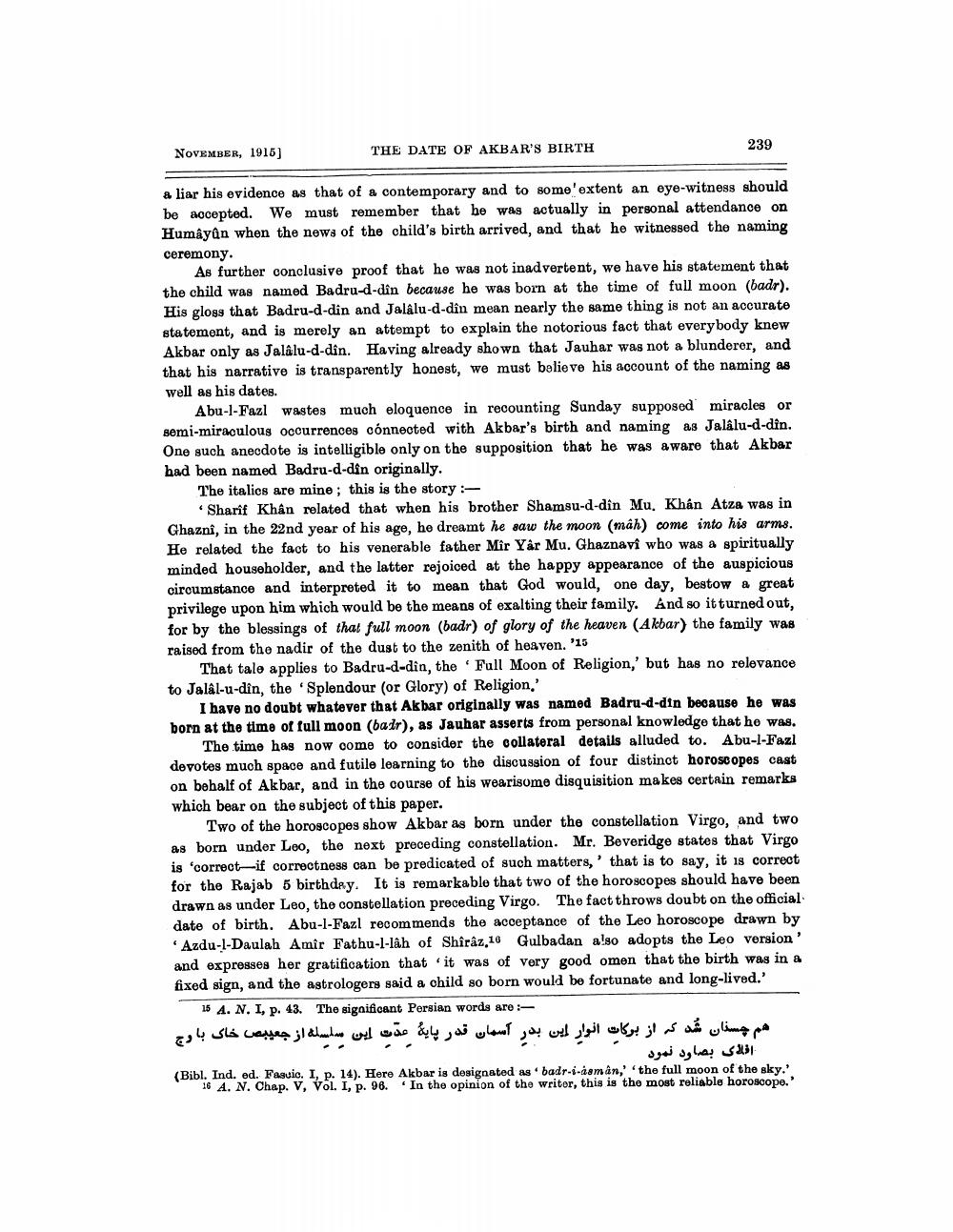________________
NOVEMBER, 1915)
THE DATE OF AKBAR'S BIRTH
239
a liar his evidence as that of a contemporary and to some extent an eye-witness should be accepted. We must remember that he was actually in personal attendance on Humâyûn when the news of the child's birth arrived, and that he witnessed the naming ceremony.
As further conclusive proof that he was not inadvertent, we have his statement that the child was named Badru-d-dîn because he was born at the time of full moon (badr). His glogs that Badru-d-din and Jalalu-d-dîn mean nearly the same thing is not an accurate statement, and is merely an attempt to explain the notorious fact that everybody knew Akbar only as Jalalu-d-din. Having already shown that Jauhar was not a blunderer, and that his narrative is transparently honest, we must believe his account of the naming as well as his dates.
Abu-l-Fazl wastes much eloquence in recounting Sunday supposed' miracles or semi-miraculous occurrences connected with Akbar's birth and naming as Jalâlu-d-din. One such anecdote is intelligible only on the supposition that he was aware that Akbar had been named Badru-d-din originally.
The italios are mine; this is the story
Sharif Khân related that when his brother Shamsu-d-din Mu. Khán Atza was in Ghazni, in the 22nd year of his age, he dreamt he saw the moon (mah) come into his arms. He related the fact to his venerable father Mir Yar Mu. Ghaznavi who was a spiritually minded householder, and the latter rejoiced at the happy appearance of the auspicious circumstance and interpreted it to mean that God would, one day, bestow a great privilege upon him which would be the means of exalting their family. And so it turned out, for by the blessings of that full moon (badr) of glory of the heaven (Akbar) the family was raised from the nadir of the dust to the zenith of heaven. '15
That tale applies to Badru-d-din, the Full Moon of Religion,' but has no relevance to Jalal-u-dîn, the "Splendour (or Glory) of Religion,'
I have no doubt whatever that Akbar originally was named Badru-d-din because he was born at the time of full moon (badr), as Jauhar asserts from personal knowledge that he was.
The time has now come to consider the collateral details alluded to. Abu-l-Fazl devotes much space and futile learning to the discussion of four distinct horoscopes cast on behalf of Akbar, and in the course of his wearisome disquisition makes certain remarks which bear on the subject of this paper.
Two of the horoscopes show Akbar as born under the constellation Virgo, and two as born under Leo, the next preceding constellation. Mr. Beveridge states that Virgo is 'correct—if correctness can be predicated of such matters,' that is to say, it is correct for the Rajab 5 birthday. It is remarkable that two of the horoscopes should have been drawn as under Leo, the constellation preceding Virgo. The fact throws doubt on the official date of birth. Abu-l-Fazl recommends the acceptance of the Leo horoscope drawn by
Azdu-l-Daulah Amir Fathu-l-lâh of Shîrâz.16 Gulbadan also adopts the Leo version' and expresses her gratification that it was of very good omen that the birth was in a fixed sign, and the astrologers said a child so born would be fortunate and long-lived.'
15 4. N. I, p. 43. The significant Persian words are :
خاک با وج
هم چنان شد که از برکات انوار این بدر آسمان قدر پایة عدت این سلسله از جعبه
انلاک بصاود نمود
(Bibl. Ind. ed. Fascic. I, p. 14). Here Akbar is designated as badr.j.daman,' 'the full moon of the sky.'
16 A. N. Chap. V, Vol. I, p. 96. In the opinion of the writer, this is the most reliable horoscope.




